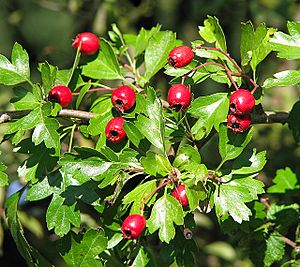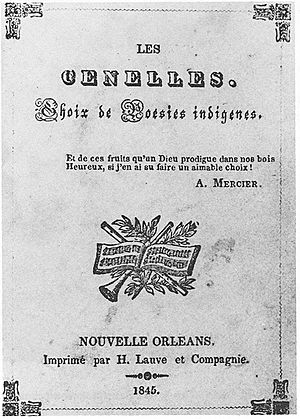Armand Lanusse facts for kids
Armand Lanusse (born around 1810 – died March 16, 1868) was an important person from New Orleans, Louisiana. He was a Creole of color, which means he was a person of mixed heritage, often with French or Spanish roots. Lanusse was also an educator, a poet, and a writer.
He is famous for editing Les Cenelles (published in 1845). This book was a collection of poems written by other Creoles of color in New Orleans. Many people consider it the first book of poetry by African Americans published in the United States. Lanusse also started and led the Catholic Institute for Indigent Orphans from 1852 to 1867. This was a school for children who needed help.
Contents
About Armand Lanusse
His Early Life
Armand Lanusse was born in New Orleans around 1812. Historians still discuss where he went to school. Some, like Rodolphe Desdunes, believed he got all his education right there in New Orleans. They say he never traveled to France.
However, other historians think Lanusse, like many other free Creoles of color at that time, might have studied in Paris for a while. It is said that Lanusse really enjoyed studying classic French literature and learning about the French language.
Starting a School
Lanusse founded the Catholic Institute for Indigent Orphans in 1848. This school was created with money from Marie Couvent. She was a Black woman who cared about her community. She left part of her money to build a school for Catholic orphans in New Orleans.
Every year, Lanusse held a special event to honor Marie Couvent. Many students at the school came from poor families. They learned a lot about literature, business, arts, and how to be good citizens. The students had to give presentations each year to show what they had learned. Their parents were invited to watch. Lanusse treated all his students fairly. He never showed favoritism based on how much money their families had.
Lanusse became the principal of the school in 1852. He stayed in that job until he passed away. He was very successful as a principal. The school became well-known and respected. According to Desdunes, the school was so good that Creoles of color no longer needed to go to Europe for their education.
During the Civil War
During the Civil War, Lanusse was a captain in the First Louisiana Native Guard. This was a part of the Confederate Army. At first, he did not like the Union army being in New Orleans. He even refused to fly the Union flag over his school. Because of this, the Union military government criticized him.
However, after the Civil War, he saw how Black Americans were treated. This made him lose hope for racial equality. Lanusse later changed his mind about the Confederacy. He started to believe that Creoles would not be able to build a better future for themselves if they stayed separate from other people of color in the United States.
Desdunes wrote that Lanusse never tried to hide his African heritage or his identity as a Creole of color. He "encouraged his people to love their fellow men." Armand Lanusse died on March 16, 1868, after a short illness.
His Poetry and Its Meaning

The poems by Lanusse and others in Les Cenelles are important to understand. They show the unique situation of Creoles of color in New Orleans before the Civil War. Because of their mixed heritage from French colonial times, Creoles of color were in a special position. They were not enslaved and often had more money than other free Black Americans. However, they did not have the same freedoms as white people in New Orleans.
Also, even though they lived in the United States, their culture and language were mostly French. Lanusse's poetry also needs to be understood in light of the laws at the time. In 1830, a law in Louisiana made it illegal to publish anything that could cause trouble among free people of color or enslaved people. Breaking this law could lead to life in prison or even death. So, the writers of Les Cenelles had to be very careful with their words.
The poetry in Les Cenelles shows a strong influence from Romanticism. This was a popular style of writing at the time. Like other French Romantic poets, the authors of Les Cenelles often looked for escape in nature and in an idealized past. Many of the poems also show their strong belief in Catholicism. They often include Catholic ideas and images.
Some literary experts disagree about whether Les Cenelles should be considered part of African American literature. Some scholars, like Henry Louis Gates, Jr., say it is "the first attempt to define a Black canon." They point to Lanusse's introduction, where he said he wanted Creole poetry to help with racial progress. Gates believes that even though the poems don't talk directly about politics, they have a political goal: to end racism. By writing like famous French authors, the poets were asking their audience to treat them like white French people.
However, other scholars argue that Les Cenelles is different from other African American literature. They say this is because Creoles of color had a different place in society. Many cultural things, like their French language, Catholic faith, and sometimes more wealth, set them apart from other Black Americans. These cultural elements are very clear in the poems of Les Cenelles.
See also
 In Spanish: Armand Lanusse para niños
In Spanish: Armand Lanusse para niños
 | Bayard Rustin |
 | Jeannette Carter |
 | Jeremiah A. Brown |


